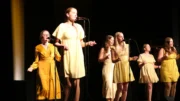LOS ANGELES (AP) — Oscar winner, take two.
Barry Jenkins’ “Moonlight” — not, as it turned out, “La La Land” — won best picture at the Academy Awards in a historic Oscar upset and an unprecedented fiasco that saw one winner swapped for another while the “La La Land” producers were in mid-speech.
Presenters Warren Beatty and Faye Dunaway apparently took the wrong envelope — the one for best actress winner Emma Stone — onto the stage for the final prize. When they read “La La Land” as the winner, representatives for ballot tabulators PwC — formerly Price Waterhouse Coopers — realized the mistake and raced onstage to try to stop the acceptance speeches. Host Jimmy Kimmel came forward to inform the cast that “Moonlight” had indeed won, showing the inside of the envelope as proof. “I knew I would screw this up,” said Kimmel, a first-time host.
Gasps were heard around the auditorium. Presenters, winners and Academy of Motion Pictures Arts and Sciences huddled to discuss the debacle. Beatty refused to give up the envelopes until he could hand them first to Jenkins. Chazelle and Jenkins hugged amid the chaos.
“Even in my dreams this cannot be true,” said an astonished Jenkins, once he reached the microphone. “To hell with dreams! I’m done with it because this is true.”
Backstage, Stone said she was holding her winning envelope at the time. “I think everyone’s in a state of confusion still,” said Stone. Later the actress, who pledged her deep love of “Moonlight,” added, “Is that the craziest Oscar moment of all time? Cool!”
It was, nevertheless, a shocking upset considering that “La La Land” came in with 14 nominations, a record that tied it with “Titanic” and “All About Eve.” Barry Jenkins’ tender, bathed-in-blue coming-of-age drama, made for just $1.5 million, is an unusually small Oscar winner. Having made just over $22 million as of Sunday at the box office, it’s one of the lowest grossing best-picture winners ever — but also one of the most critically adored. “Moonlight,” released by indie distributor A24, also had some major muscle behind it, including Brad Pitt’s Plan B, which also backed the 2015 winner “12 Years a Slave.”
“It was unfortunate that things happened as they did but, goddamn, we won best picture,” the still cool and composed Jenkins told reporters.
The “La La Land” team was celebrating onstage when producer Jordan Horowitz took to the microphone to say: “There’s been a mistake. ‘Moonlight,’ you guys won best picture.” He then graciously passed his statue to the “Moonlight” producers, saying, “This is not a joke.”
“I noticed the commotion that was happening and I thought that something strange had occurred,” Jenkins said backstage. “The last 20 minutes of my life have been insane.”
“Moonlight” co-star Mahershala Ali, the supporting actor winner, said the conclusion “threw me a bit.” ”I don’t want to go up there and take anything from someone,” he said afterward. “It’s very hard to feel joy in a moment like that.”
In a statement, PwC apologized to each film, Beatty, Dunaway and Oscar viewers. “The presenters had mistakenly been given the wrong category envelope and when discovered, was immediately corrected,” said the accounting firm. PwC, which has long watched over the Oscar ballots, said it was currently investigating “how this could have happened.”
For “La La Land,” a musical in which reality repeatedly intrudes on fantasy, it was another alternate ending. “La La Land” still collected a leading six awards, including honors for cinematography, production design, score, the song “City of Stars” and best director.
Up until the frenzied end, the telecast had seesawed between jabs at Donald Trump and passionate arguments for inclusivity. “All you people out there who feel like there isn’t a mirror out there for you, the academy has your back, the ACLU has your back and for the next four years we will not leave you alone, we will not forget you,” said Jenkins, whose film is, in three chapters, about a young black kid growing up poor and gay in impoverished Miami.
Kenneth Lonergan, the New York playwright whose last film (“Margaret”) was beset by lawsuits and conflict, won best original screenplay for “Manchester by the Sea.” ”I love the movies. I love being part of the movies,” said Lonergan. After the wild ending, Lonergan deadpanned to reporters, “It turned out that we actually won best picture.”
Shortly later, Affleck — in one of the night’s most closely watched races, won best actor — his first Oscar — for his soulful, grief-filled performance in Lonergan’s film. “Man I wish I had something bigger and more meaningful to say,” said Affleck, who hugged his more famous brother, Ben, before taking the stage.
Viola Davis, co-star of Denzel Washington’s August Wilson adaptation “Fences,” won best supporting actress. She and Ali, both widely expected winners, marked the first time in more than a decade that multiple Oscar acting honors went to black actors.
Ezra Edelman’s “O.J.: Made in America” took best documentary, making it — at 467 minutes — the longest Oscar winner ever, beating out the 1969 Best Foreign Language Film winner “War and Peace” (431 minutes).
The “OscarsSoWhite” crisis of the last two years was largely quelled this season by a richly diverse slate of nominees, thanks to films like “Moonlight,” ”Fences” and “Hidden Figures.” A record six black actors are nominated. For the first time ever, a person of color is nominated in each acting category.
The nominees follow the efforts by Academy of Motions Pictures Arts and Sciences President Cheryl Boone Isaacs to diversify the membership of the largely white, older and male film academy. “Tonight is proof that art has no borders, no single language and does not belong to a single faith,” said Isaacs.







































